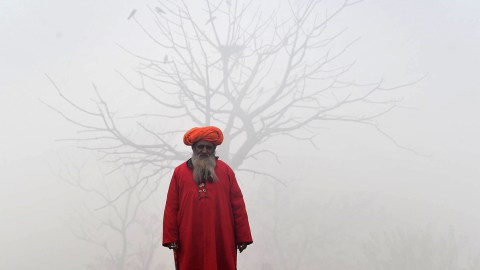Beauty in Islam is Being Overlooked Thanks to Nationalist Fervor

Writing critically or intelligibly about Islam has become a liability. To the American nationalist any mention of the term is disqualifying. To the neoliberal, a hint that Islam’s metaphysics might promote violence is grounds for xenophobia. America cannot seem to survive without a monster under the bed, regardless how imaginary the beast actually is.
Regardless of one’s beliefs, cultures that religious ideologies create produce incredible works of expression. Some of the most fascinating explorations of the human condition can be attributed to Sufism, a small and often persecuted sect of Islam primarily interested in replicating mystical experiences attributed to Muhammad. Similar subgroups are found in the Gnostics, Kabbalists, Zen, and sadhu groups of Hinduism.
Sufism in many ways originated as a populist movement. When Islam quickly split after Muhammad’s death, certain followers did not appreciate the dogmatic political alliances that formed. To a Sufi, fana, annihilation, is the goal of the spiritual experience—as Sufism’s famous proponent, most popularly known today as Rumi, writes, we aim to dissolve with the divine like a moth into a flame.
As scholars and politicians collaborated against mystical practices after the appointment of Muawiyah in 661 CE, the imperialistic Umayyad era took control of the Arab world. The ulama, Islamic scholars, sought to outlaw this group whose name is believed to have been derived from the term fuq, which means “wool” but has a linguistic connection to “above” and “transcending.” Sunnis and Shias have been fighting since Muhammad’s death; the lesser of them share a common enemy in Sufis.
This tone has relaxed a bit more recently as Sufism’s influence in arts and culture has spread globally. For example, the predominant Muslim group in Mali is comprised of Malikite Sunnis, who have entwined Sufism into their worldview. This is why the extremist Islamist ban on music in that country is so disheartening—music is a main vehicle for transcendence. Mali is one of the most musically rich nations on the planet. Watching world-class artists flee home in recent years has been tragic.
Another reason this anti-Islam fervor spreading across America is disturbing. I have no personal investment in any belief system; I attribute religious ideas to the vast diversity of the human imagination. Our brains are never satisfied with gaps in understanding. To fill those in we invent gods through epic mythologies. The result can be taken literally or artistically. In one case, extremism; in the other, music, poetry, innumerable great achievements that deeply touch us.
The inability to differentiate between the two is largely due to an unwillingness to think critically about the subject matter. This is as true in Orthodox Judaism and Evangelicalism as in Islam. When your metaphysics demands an out-group of which only you and your tribe are excluded, problems are unavoidable.
Not so in Sufism and other similar expressions of Islam. Take one of the most important Muslim artists of the past century as an example: Nusrat Fateh Ali Khan.
The torch of qawwali music was passed to Nusrat; this familial tradition has been going strong for over six hundred years. Qawwali was predominantly confined to weddings, funerals, and rituals in India (and eventually Pakistan, after Partition) until Nusrat spread this music globally. He believed devotional Sufi poetry too important to confine to one nation.
And so tirelessly he toured and recorded, collaborating with an incredible range of artists: Eddie Vedder, Peter Gabriel, and Michael Brook top to mind. He allowed the traditional structure of qawwali to be infused with guitars, electronic beats, and foreign folk instrumentation, likewise offering his voice on soundtracks such as The Last Temptation of Christ, a beautiful merging not only of musical forms but of faiths as well.
To this day he continues to inspire. On the Legacy edition of Live at Sin-e, Jeff Buckley calls Nusrat his “Elvis,” covering “Yeh Jo Halka Saroor Hae” accompanied only by acoustic guitar. When he begins singing the audience laughs, probably thinking he’s faking Arabic. But he’s not; soon the room is transfixed. More recently, Dave Navarro used a loop of Nusrat to construct the Red Hot Chili Peppers’ song, “Circle of the Noose.”
At the root of Nusrat’s music, as in all Sufism, is devotion. He passed from a heart attack in 1997 at the age of 48. With no children, his nephew Rahat took over the family qawwali role while becoming a successful playback singer in Bollywood. Nusrat’s other nephews, Rizwan and Muazzam, formed in the nineties and have also partaken in groundbreaking projects, such as the qawwali-dub record with Temple of Sound, Peoples Colony No 1. In each instance, they are sharing their cultural roots for the betterment of humanity.
This is what I think of first when Islam is mentioned: an otherworldly music rooted in the belief that together we are stronger than divided. For the last few decades Pakistan’s most prominent musical family has made this a goal. This is not to look blindly past the holy wars being waged by pockets of self-interested extremists. Fundamentalism is part of our evolutionary tribal origins and should be expected.
Yet there is so much more to Islam. What you merge into at the end of your time on this planet—a flame, soil, or cosmic ether—is not nearly as important as what you do with your time on earth. Religion has long gotten that backwards. The rituals that have sprung up as a response to our place on this planet are another story. To those willing to listen, an unfolding of the greatest accomplishments of the human spirit awaits. It’d be a shame to close your ears to that.
—
Derek Beres is working on his new book, Whole Motion: Training Your Brain and Body For Optimal Health (Carrel/Skyhorse, Spring 2017). He is based in Los Angeles. Stay in touch on Facebook and Twitter.




